Last October, the Third Luojia Think Tank Forum, co-organized by Wuhan University and Guangming Daily, is held at Wuhan University. This forum attracted experts and scholars from multiple universities, international organizations and think tank institutions. They exchanged their observation on China’s opportunities in the developing world, China’s responsibilities for global governance and China’s role against the profound changes taking place in the international arena upon the theme of “changes of global governance system and China’s viewpoints”
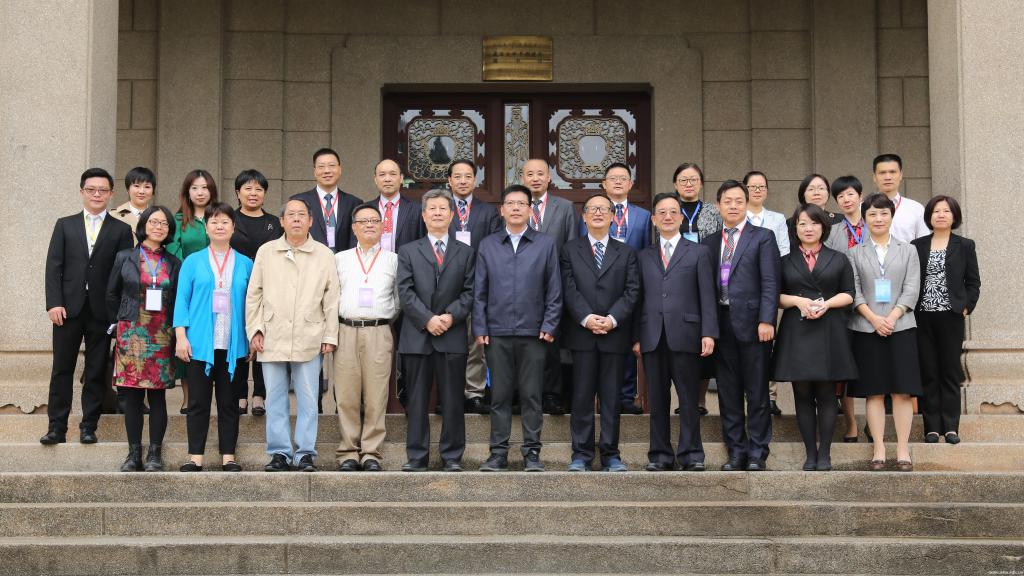
Experts and scholars at the forum
Dou Xiankang, president of Wuhan University, Lu Xiangao, vice chief editor of Guangming Daily, and other distinguished guests from academic circle and the press attended the opening ceremony.
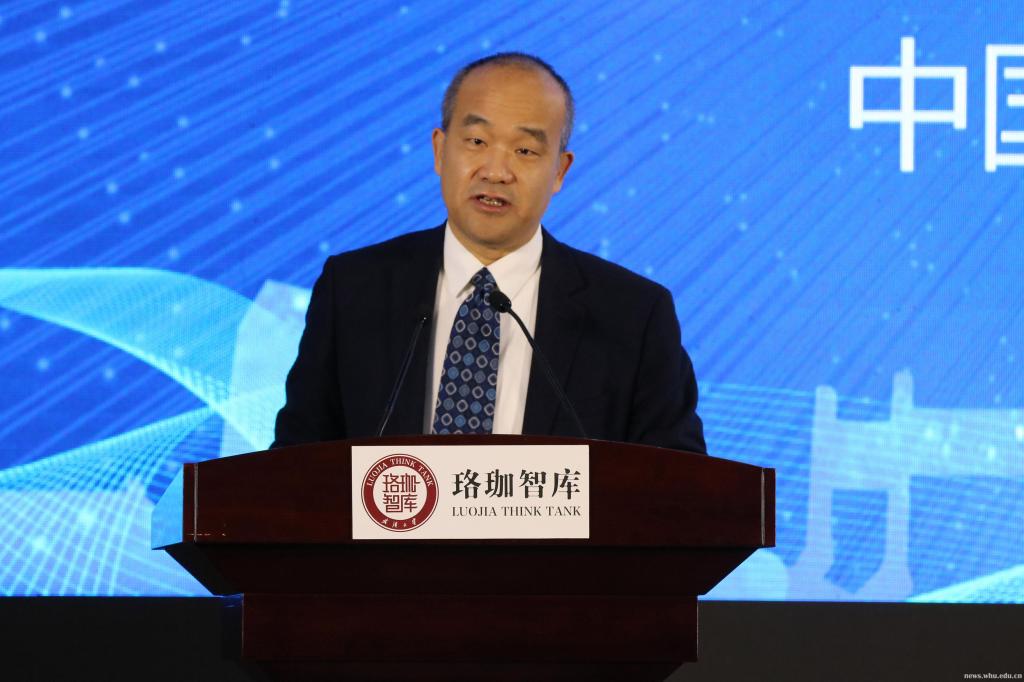
Dou Xiankang
At the opening ceremony, Dou addresses that President Xi Jinping attaches great importance to the construction of national high-end think tanks. Wuhan University responds actively to the calls of the Central Committee through its attempts to establish think tanks with Chinese characteristics and international influence for providing supports to the Party and the government’s decision-making process. Specific measures include enhancing the construction of first-class disciplines and providing more platforms for innovative academic achievements and talents of higher quality.
First, focus on major issues and actively build new-type think tank platforms. Against the backdrop of world civilization communication, Institute for Advanced Study in Dialogue of Civilization’s has been established based on high-quality humanities. Institute for Network Governance has been established to tackle issues of common concern on cyberspace international governance.
Second, provide WHU wisdom and propose opinions of the Luojia Think Tank on major issues. An expert team led by Prof. Hu Dekun and Yi Xianhe have taken actual part in safeguarding legitimate interests of Diaoyu Islands and South China Sea, which exerts important impact at home and abroad and attracts wide recognition. And multiple reports on the Belt and Road Initiative (BRI) submitted by Institute of International Law have drawn attention from Central Committee.
Third, support innovation of global governance system via competent talents. Talents are the primary strategic resources, and Wuhan University has made significant achievements in building high-level talent teams since implementing the strategy of Strengthening School with Talents in 2017. Centre for Studies of Information Resources has been hailed as an innovation group of National Natural Science Foundation of China, and there is a high-level talent team including 3 Chang Jiang Scholars, 1 Young Chang Jiang Scholar and 1 Young Top-notch Talent in Institute of International Law. This year marks the 70th anniversary of the founding of the People’s Republic of China, and we will definitely play a more remarkable part in global governance system as we become wealthier and stronger. Representatives at the forum are expected to discuss deeply and share their wisdom, thus producing high quality forum results, providing new thoughts for China’s active participation in the innovation of global governance system, and new visions for promoting the construction of new-type think tanks with Chinese characteristics.
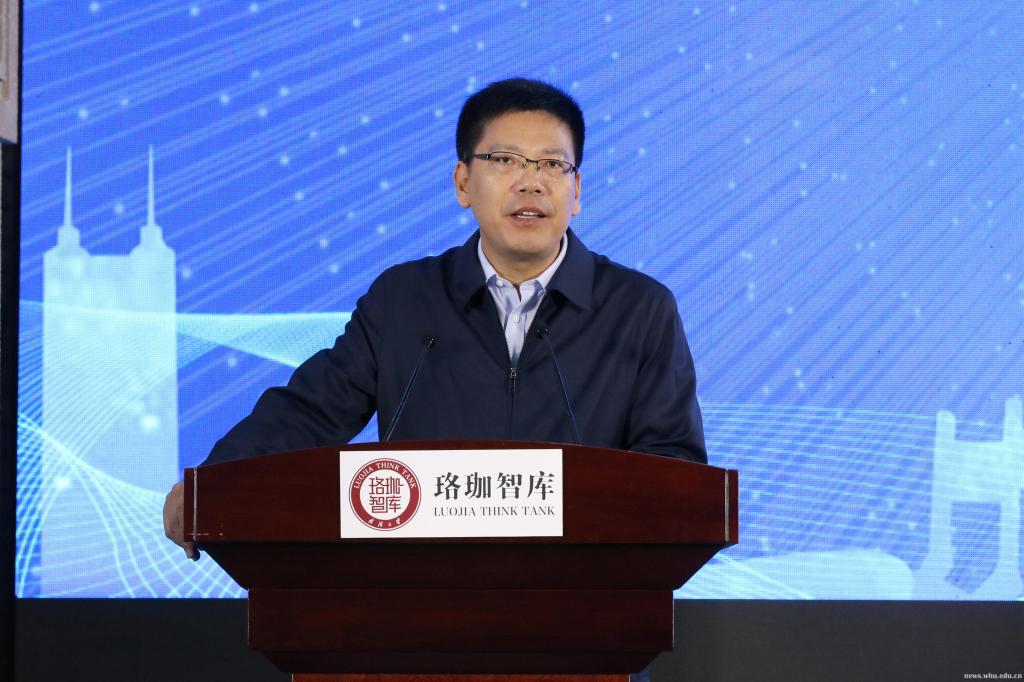
Lu Xiangao
In Lu Xiangao’s speech, he states that China’s promoting reform of global governance system requires ever stronger national prestige in the world, for consensuses among all the parties and enhanced coordination and cooperation. President Xi gives stress to the abilities to make rules, set agendas, publicize and coordinate when taking part in global governance, the improvements of which require the cooperation between think tanks and media. In recent years, Wuhan University has attached great importance to the construction of think tanks with fruitful achievements, and the think tank matrix, represented by the first group of national high-end think tanks and Institute of International Law, which has become a highlight of Think Tanks of Chinese Universities. In recent years, Guangming Daily has actively built Guangming Think Tank and successfully combined think tanks with media. Guangming Daily will stick to the position as an ideological and cultural newspaper and stick to innovation to better unite, contact, guide and serve the intellectual community.
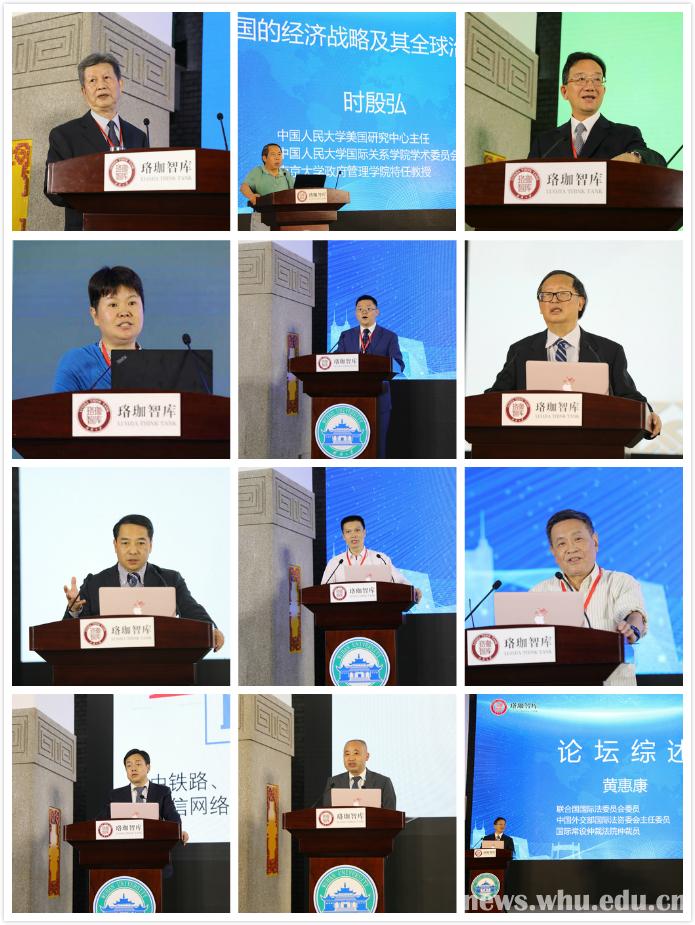
Guests attend the forum and deliver speeches
Attendees to the forum to deliver speeches include Huang Huikang, member of the International Law Commission of the United Nations and chairman of the International Law Advisory Committee of Ministry of Foreign Affairs, Yang Jiemian, director of the Academic Committee of Shanghai Institutes for International Studies, Shi Yinhong, director of Centre of American Studies, Renmin University of China(RUC), Zhang Haiwen, director of China Institute for Marine Affairs of Ministry of Natural Resources, Wang Yiwei, professor of School of International Studies of RUC and associate dean of Institute of Xi Jinping’s Thought on Socialism with Chinese Characteristics for a New Era of RUC, Ding Xueliang, Distinguished Professor of Shenzhen University, Liu Weiping, researcher of the China Development Bank, Hu Dekun, senior professor of Humanities and Social Sciences of Wuhan University, Xiao Yongping and Nie Jianqiang, director and vice director of Wuhan University Institute of International Law, Yu Minyou, director of Wuhan University China Institute of Boundary and Ocean Studies, Ruan Jianping, associate dean of School of Political Science and Public Administration of Wuhan University, Huang Zhixiong, associate dean of School of Law of Wuhan University.
The forum is divided into three sub-forums: changes of global governance system and China’s views, changes of global governance system and Sino-US relations, changes of global governance system and BRI. Xiao Yongping, Yu Minyou and Nie Jianqiang host each of the three units respectively.
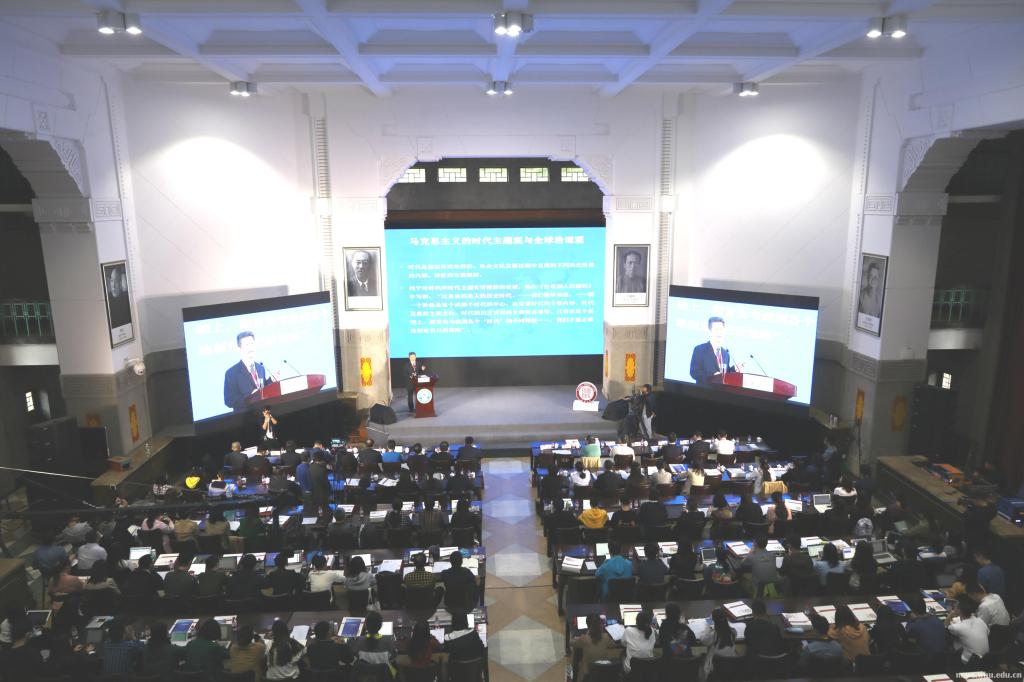
Experts are giving keynote speeches
In the first sub-forum, five experts—Hu Dekun, Shi Yinhong, Huang Huikang, Zhang Haiwen and Huang Zhixiong—shared their views on “changes of global governance system and China’s views”. Hu Dekun interpreted Marxist Views of the Times and Global Governance, Shi Yinhong interpreted China’s economic strategy and its meaning in global governance, Huang Huikang talked about “changes of global climate governance system and China’s views”, Zhang Haiwen analyzed the profound changes the global ocean governance system is undergoing, and Huang Zhixiong stated his opinions on global network governance and China’s views.
In the second sub-forum, three experts—Yang Jiemian, Liu Weiping and Ruan Jianping—discussed on the topic of “changes of global governance system and Sino-US relations”. Yang Jiemian pointed out that the trend of interaction between China and the US in terms of global governance system will largely influence the development track of international community in the long run. Liu Weiping believed that the Sino-US trade friction is not the best way for the US to reach such economic goals as reducing trade deficits and increasing domestic employment. And Ruan Jianping held that the joint pursuit of BRI has profound geo-economic and geopolitical impact as well as ushering a new way of regional integration.
In the third sub-forum, three experts—Ding Xueliang, Wang Yiwei and Xiao Yongping—discussed on the topic of “changes of global governance system and BRI”. Ding Xueliang mentioned that there should be a clear baseline in terms of running programmes of BRI-related countries, Wang Yiwei analyzed the impact on the joint pursuit of BRI from material, system and spiritual perspectives, and Xiao Yongping advocated the set-up of a BRI construction mode based on rules in the new stage of high quality construction of BRI.
At the closing ceremony, Huang Huikang makes a forum summary. He said, the experts have studied and judged the current situation of international governance, discussed China’s ideas and proposals of taking part in global governance, and emphasized China’s rule awareness in taking part in global governance. Experts’ comments are highly targeted. Global governance is entering a critical period currently, and it is a tough task to promote changes of the global governance system. Advanced concepts are needed to guide the changes, and here lies in historical missions of China’s think tanks. These think tanks should take their initiatives to obtain China a bigger say and greater influence.
It is known that Wuhan University has held the Luojia Think Tank Forum for three times in close cooperation with Guangming Daily since 2017, and the forum has become an annual think tank brand activity co-organised by a famous Chinese university and a mainstream central medium. Each year, the topic of the forum would be an issue which is vital for national development and attracts much social attention, and experts from China’s think tanks would be invited to express their views. The topic of 2017—New Era, New Concepts, New Systems—focused on economic development, and the topic of 2018—Strategy for building up the strength of the nation through cultural development in the new era—focused on cultural construction, which is of equal importance in political consultation and public opinion guidance.
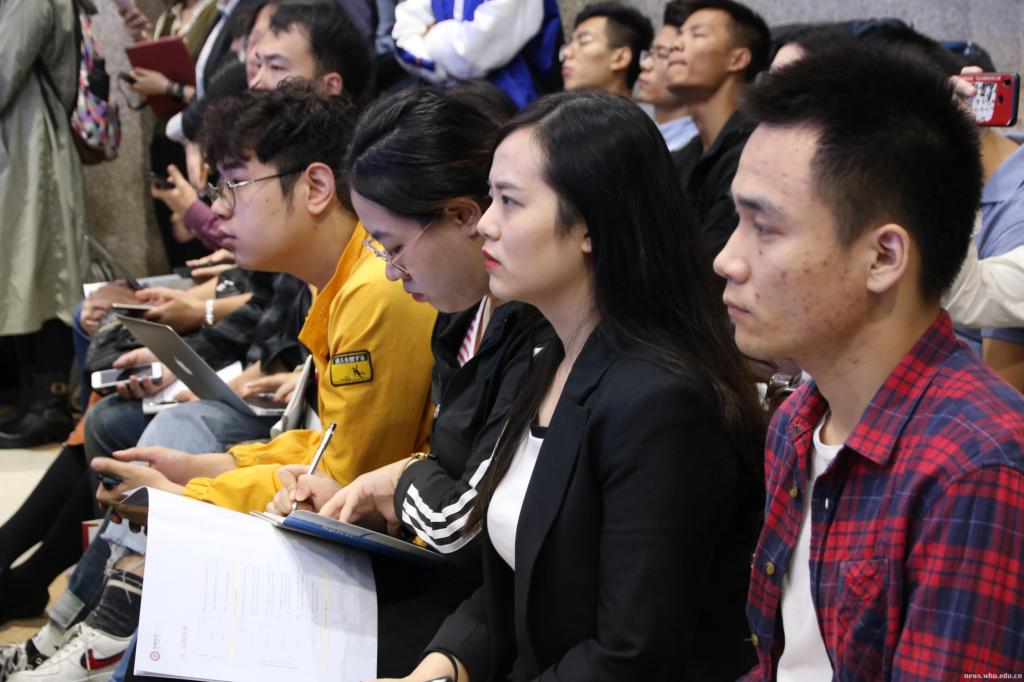

Teachers and students are listening to the speeches and taking notes carefully
Rewritten by Liu Xinfan, edited by Shen Yuxi and Hu Sijia